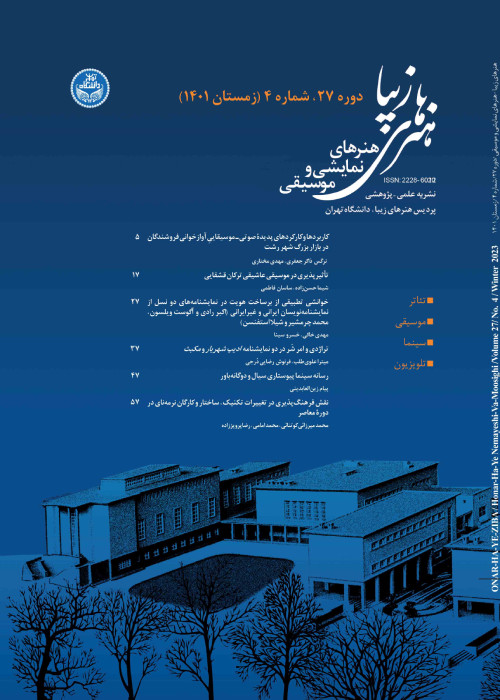The Role of the New Schooling System of the Reza Shah Era as a Bureaucratic Institution in the Legitimacy of the New Iranian Theatre
Author(s):
Abstract:
In the history of modern Iranian theatre, the establishment of official and academic institutions responsible for teaching theatre is noteworthy. How such institutions were founded, and what sort of function they were supposed fulfill and other societal factors is a historical perspective which has not undergone a rigorous study. The current article will focus on the history of Iranian theatre, employing a sociological approach. The theoretical framework used for this study is that of French sociologist and theorist of the 1970s and 1980s, Pierre Bourdieu. His most well-known book Distinction, gives us a model for analyzing different "social capitals. In his opinion, cultural activity requires a specific legitimacy to flourish. In other words, without a specific purpose cultural activity becomes small and meaningless. The fledgling theatre of the Reza Shah's era was not an exception. Although theatre was introduced in Iran in the late 19th century and the first major Iranian plays were written during that time, the essential and substantial growth of this art took place during Reza Shah Pahlavi's reign during which the first academic institutions were established to expand and maintain the art of theatre in the country. In this specific period of time, one of the major tactics in the organization of cultural activities was the establishment of an official and bureaucratic institution for the supervision and guidance of artistic endeavors. After Reza Shah's coronation as a king, modernization was based on a nationalistic and central power, which took its basis from the army and bureaucratic organizations. The newly established field of Iranian theatre was also under strict supervision of the governmental organization named Sazman e Parvaresh e Afkar (Organization for the Growth of Thoughts) in order to gain the legitimacy it required for the new cultural situation of the country. This organization paved the way for the foundation of the theatre schools in order to train educated theatrical artists. These artists were not simply trained, but were actually driven towards issues which were of interest for the central government, thus referring back to Bourdieus social capitals. That is why we see plenty of nationalistic plays and performances in that specific time scope, fulfilling the visions of the societal modernization in the eyes of the reigning king. The present study deals with this issue by considering the cultural grounds of the early 20th century in Iran, and studies the process of the establishment of theatrical schools, which provided educational capital for the cultural capital of the people active in theatre of that time. The article shows the efforts on the part of the central government to control non-central theatrical groups which were believed to be a resisting margin against the government. The other factor that is considered, is the development of a new generation of theatre artists who behaved differently in comparison to their predecessors, and aimed to drive their artistic productions towards aesthetic values. This created a change within a change. As a reaction to all of these changes, the cultural capital led to the emergence of artists who were ultimately driven away from politi
Keywords:
Language:
Persian
Published:
Honar-Ha-Ye-Ziba: Honar-Ha-Ye Mosighi Va Namayeshi, Volume:22 Issue: 56, 2017
Pages:
125 to 135
magiran.com/p1736713
دانلود و مطالعه متن این مقاله با یکی از روشهای زیر امکان پذیر است:
اشتراک شخصی
با عضویت و پرداخت آنلاین حق اشتراک یکساله به مبلغ 1,390,000ريال میتوانید 70 عنوان مطلب دانلود کنید!
اشتراک سازمانی
به کتابخانه دانشگاه یا محل کار خود پیشنهاد کنید تا اشتراک سازمانی این پایگاه را برای دسترسی نامحدود همه کاربران به متن مطالب تهیه نمایند!
توجه!
- حق عضویت دریافتی صرف حمایت از نشریات عضو و نگهداری، تکمیل و توسعه مگیران میشود.
- پرداخت حق اشتراک و دانلود مقالات اجازه بازنشر آن در سایر رسانههای چاپی و دیجیتال را به کاربر نمیدهد.
دسترسی سراسری کاربران دانشگاه پیام نور!
اعضای هیئت علمی و دانشجویان دانشگاه پیام نور در سراسر کشور، در صورت ثبت نام با ایمیل دانشگاهی، تا پایان فروردین ماه 1403 به مقالات سایت دسترسی خواهند داشت!
In order to view content subscription is required
Personal subscription
Subscribe magiran.com for 70 € euros via PayPal and download 70 articles during a year.
Organization subscription
Please contact us to subscribe your university or library for unlimited access!


